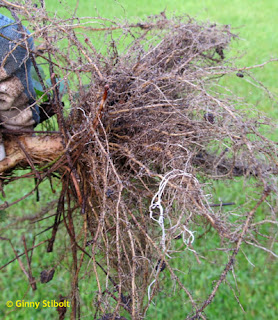 |
| Marigolds as a cover crop: they are not only useful, but also beautiful and attract butterflies and bees. |
This is my experiment to see if I can reduce the root-knot nematode populations in my gardens.
First, as I've been preaching in my talks, just planting marigolds around the tomatoes does not prevent nematode damage. Here is the result...
 |  |
| The original garden soil has plenty of earth worms. | After smoothing the soil I sprinkle a light layer of grass clippings and then cover with pine needles and then irrigate with rain barrel water. |
 |
| The walking onions need to be walked to another spot! The onions are in the pot next to the garlic chives. |
Crop Rotation
When you plant the same crop in one place year after year, it causes several problems, but here are the two biggest problems:
- It depletes the soil of the same nutrients over and over.
- Its soil-borne enemies, such as root borers, are already in place to attack it the next time.
Crop rotation by plant family helps to combat these problems, especially in organically managed gardens. For instance, if you plant parsley in one bed, plant a crop that is not in the carrot family there for at least the next two seasons.
This is easy enough to do if your crop lasts only one season, but with a perennial crop like walking onions or garlic chives, it's a different strategy. After my walking onions had been in place for at least six years, this year, they started to deteriorate. I usually use them for only for their greens, but when I dug them up, something had been eating their bulbs. So it's time to clean them up and walk them to an entirely new bed. I think I'll move them to the herb garden behind the chives. I need to plant some more chives there as well.
The garlic chives have only been in place for two years, so they are still looking good, but I'll thin them out to start some in a different location--maybe even a pot.
This year I grew lime basil and at this point in the season, the leaves are extremely citrusy and will probably not be useful for "normal" pesto. We'll see what we come up with maybe we'll think of something interesting to do with it.
How does your garden grow?
Green Gardening Matters,
Ginny Stibolt



No comments: